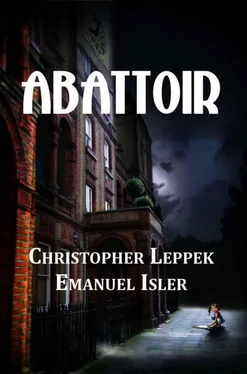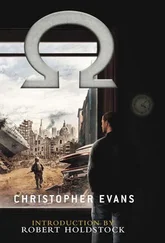At the home, she could no longer wander. She’d been placed in a special section, reserved for people just like her—those in the advanced stages of Alzheimer’s. The windows were barred, the doors routinely locked, along with myriad precautions which kept her “safe and sound,” as the head nurse liked to put it.
Although there was no kitchen in her new home, Sharon’s mother was often busy cooking. She would lift imaginary pots and pans onto her fantasy stove, stir imaginary stews and soups in them, and then smile as she offered her daughter an invisible taste.
She kept it up for hours at a time, maintaining the strange ritual until a week before she died.
Sharon awoke from the memory with a start. She was in her flat at the Exeter, standing before her own stove, stirring a pot that wasn’t there, with a spoon that didn’t exist.
She gasped.
“Oh God… ”
But the smell was unmistakable—apple pie, spiced with cinnamon, baking. In her oven.
In spite of herself, she flung open the oven door and was blinded by a brilliant flash of white light.
She was no longer in her flat. She was in a place she didn’t recognize. An antiseptic, sterile place, with pastel green walls, pristine white borders outlining the windows and door.
An Alzheimer’s facility, her mind whispered.
The faint sound of soothing Muzak came from somewhere. The soft hiss of air conditioning was barely perceptible. Everything was cast in the soft glow of indirect lighting.
All of it was designed, she knew, to keep people like her calm. To keep them from the powerful urge to wander. To keep them safe from themselves.
She touched the softly rounded corner of her table, placed safely in a little nook against the wall. She walked to the bathroom and saw how the toilet seat stood out in brilliant red.
Contrasting colors are easily discerned by Alzheimer’s patients , her mind whispered again. The furniture is padded for obvious reasons. The designs are simple and clean, so as not to confuse the mind.
She had to get out of here, her mind now screamed.
I don’t belong here. I’m not one of them. I’m a psychiatrist. I am not my mother!
Sharon made for the door, then stopped. Before her was something black, rectangular.
What was it? Some sort of hole; a door before the door, but to where ?
A hole? A deep, bottomless abyss to keep her from crossing the threshold to freedom?
No… just black tiles, designed to confuse. Alzheimer’s sufferers saw the color black as a vacuum, an empty space, an impassable barrier.
But it looks so forbidding. So deep. So terrifying.
It’s nothing but fucking black tiles!
She lifted a foot tentatively above the abyss, then pulled back. How could she be sure ?
She ran her fingers through her hair, perspiring heavily. She took a deep breath.
Would you rather die, or spend the rest of your life in this place? Putting it like that, there really was no choice at all.
She stepped out into the void.
There was a brief sensation of falling, similar to what she sometimes felt shortly before falling asleep. A chill ran the length of her spine.
The room disappeared, as did the doorway, as did the black hole.
Above her was blue sky; below, three stories down, green grass. In her face was a fresh autumn breeze.
Sharon found herself standing on the stone railing of her balcony at the Exeter, inches from death. One of her feet was suspended in the air. Her entire body was leaning forward. She felt gravity trying to pull her like a groping hand.
I don’t want to die… please…
She teetered, a clumsy tightrope walker, for what seemed like a very long time; the difference between death and life too small to measure. The sudden spark of survival instinct dragged her back from the brink; balance slowly returning, allowing her to inch back, back towards the building.
At last, her fulcrum shifted. Gravity finally became her ally. She fell back onto the hard floor of the balcony, weeping for an hour before she could stand again.
=§=§=§=
It felt nice here, like something from long, long ago; almost, but not quite, forgotten.
This shape was pleasing, familiar and had a temperature that did not hurt. It posed no threat; it helped, tried to understand…
But the temperature was rising. Something displeased this shape, frightened it. This was different; this one oscillated, as if it were riding, or suspended in the air.
It began to fade, then returned. Departed, returned, departed…
Fear, growing…
This one, the soother, was afraid. This one traveled, not knowing the destination, fearing the journey. This one made a great vibration.
And it was terrifying.
Solid forms allowed passage away from this fear, from this undulation . Darkness and cold again, obliterating comfort.
Again, solitude.
=§=§=§=
Cantrell should have been dreading the meeting, but he wasn’t. The news would be bad—of course it would—but being away from the place had somehow given him a sense of calm that he hadn’t felt in months.
He chose to take side streets instead of the highway, actually enjoying the ride downtown. The leisurely pace gave him a little time to think.
His destination, the office of his lawyer, was still 20 minutes away. The sky threatened snow, and the streets had little traffic in mid-afternoon.
So much had changed since his last meeting with his attorney, when the business of the Exeter was consummated and formalized. That had been a time of excitement, of creation, of what appeared to be a boundless future, based on his dream and his hard work.
Now, only nine months later, his entire world had turned as bleak and hopeless as the sky above.
The past two weeks had been the worst. The Exeter had become his Titanic, her tenants the passengers scrabbling for the lifeboats.
Each day saw another departure; another moving van and broken lease. Only a few of them had actually said goodbye. Even fewer had stated their reasons. All of them, however, had the same look of relief on their faces when they exited the front door for the last time. One of them even made a sign of the cross upon heading out into the cold December morning.
They were terrified, all of them, and Cantrell had no problem understanding why: They believed that the building had turned against them, that it had murdered two people, drove another two to insanity; almost killed another. They wondered when their turn would come.
Cantrell knew that he’d been living in a state of hardcore denial about the whole thing. He could no longer hide behind that cloak. Nor could he blithely reassure nervous tenants that everything would be just fine; that everything that had happened in that building was a product of coincidence, imagination, confusion or structural adjustment. Not that he had any better idea as to why the ship was sinking so fast. Was the place cursed? Lousy with demons and murderous poltergeists? The very notion made him want to laugh, but he couldn’t.
Even so, as its captain, its creator , he could not desert the Exeter.
§
He parked his car in the bowels of his lawyer’s building and made his way up to the 15th floor, noticing how modern and sterile the building looked in comparison to his own.
Josh Billings looked grim when he rose to shake his client’s hand.
Not a good sign . But not terribly surprising.
He sat before his attorney, beginning the conversation with a simple question:
“How hopeless is it?”
The lawyer grimaced before replying. Billings asked Cantrell if he would mind if he lit a cigarette.
Читать дальше












